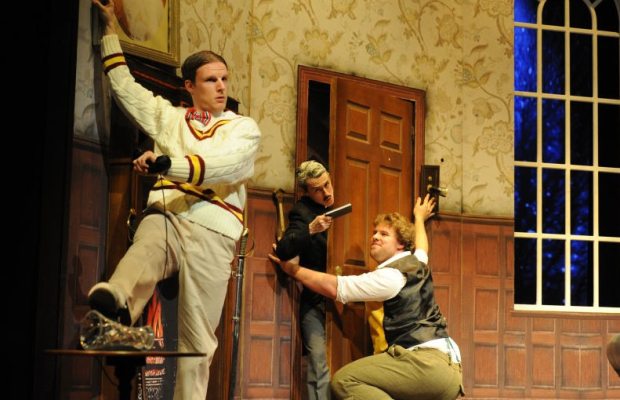Michael Coveney: Why we love the shows that go wrong
‘It’s the combination of material accident and thespian shame the truly sadistic coarse theatre lover is craving’

Accidents happen in theatres, and when the result is physical injury, it's never funny. But when there's no harm done – or even better – when the play goes wrong for reasons of stage management, or an outbreak of coarse acting, or backstage panic, there's nothing we like more.
This phenomenon of wallowing in mumming mishap is enshrined in Michael Frayn's Noises Off, where the hapless actors are entangling their own lives in a seaside farce called 'Nothing On'; highlights include the sudden elevation on the cast list of a plate of sardines and the chaos and confusion of a wayward five-minute intermission call that has the director going berserk and elderly punters in Goole colliding with each other in the foyer.
Two West End plays have lately cashed in on this syndrome – the WhatsOnStage Award-winning The Play That Goes Wrong and last week's Stop – The Play at Trafalgar Studios – but the real creative panic that characterises both shows is something that dates back to the days of weekly rep. And those days are being enthusiastically re-visited at the Theatre Royal, Windsor, where a single company of actors is half way through a six-week season of six plays, one performed after the other for a week each.
The theatre in Windsor became a weekly rep in 1938, and it's a test of the current season to see what was good, and indeed bad, about that system. There's nothing "good" about The Play That Goes Wrong except in making a farcical virtue of mistimed entrances, collapsing sets and disastrous crossed purposes, all stemming from shoddy preparation, human incompetence and pressures of time.
Stop – The Play is different, and more like (though infinitely inferior to) Noises Off in focusing on the physical embarrassment of the actors dealing with words and speeches, rather than sets and properties, that are either in the wrong place or ludicrously inappropriate. It's the combination of material accident and thespian shame the truly sadistic coarse theatre lover (and, let's face it, most of us are) is positively craving.
I saw the second play in the Windsor season, Sweet Revenge, a tight, taut thriller by Francis Durbridge, author of the Paul Temple stories which have been lately recycled in full 1950s period fig on BBC Radio 4. Disappointingly for the accident aficionado, little went seriously wrong, although some of the actors were struggling for the next line and one or two fell (I'm glad to say) into the coarse theatre trap of being unable to take or leave the stage without a lot of looking around hoo-ha and even full-on waving at someone who's standing just a couple of feet away.
The most extraordinary thing about the evening was the rapt attention bestowed on the play by the predominantly elderly audience. It was clear they were there for one thing, and one thing only: the story, what happens next, whodunit. The flatness of the production, the garishness of some of the acting, the nuance of non-embarrassment, the crudity of thought and dramaturgy… this was absolutely none of their business whatsoever. Criticism is not only helpless in these circumstances. It's useless. Should I care? Not really.
Bill Kenwright owns the theatre and conducted a similar experiment at the Palace Theatre, Westcliff, a few years back, when he mounted a complete festival of Agatha Christie's plays. It did fairly well, but not as well as he'd hoped. I mean, even the target audience for such fare, and most of them do actually live in Westcliff-on-Sea, are delighted to see one or two, perhaps even three, Agatha Christie plays in a short space of time… but 17?
So, for the Windsor season, Kenwright and his appointed producers, Paul Taylor-Mills (who produced In the Heights at the Southwark Playhouse and runs another weekly rep season in Sidmouth, Devon) and Lillie Collier (who has an amazingly wide portfolio as a director, producer and improviser) have done something different. They are actually taking weekly rep upmarket.
Next week's play is Noël Coward's Hay Fever, a brilliant comedy about absolutely nothing and therefore extremely difficult to do; followed by Alan Ayckbourn's lacerating comedy Joking Apart; and, finally, David Hare's Amy's View, which pokes fun at the media and mounts a lyrical defence for the serious theatre in the wonderful role written for Judi Dench.
Of course, there may be fun to be had in actors falling short in the demands made on them by such material – far richer and classier than Francis Durbridge – but there will be room, too, for the sort of lowbrow comedy I most treasure in the plays that go wrong: as in the production of William Inge's Bus Stop at the Watermill, Newbury, in which an actor entered from a swirling snow storm with only one side of his coat covered in big white flakes; or the King Lear in Cardiff where Lear gratefully tossed the disguised Kent a purse of gold which sailed between the loyal duke's upstretched arms like a rugby ball between posts and landed with a thud in the wings. That wasn't the end of it: Kent retrieved the purse and re-entered with a big grin, a "thankee milord" and a thumbs-up. I'd barely recovered from that when, in the reunion scene with Cordelia, Lear's beard fell off. That's the spirit (if not the spirit-gum).













